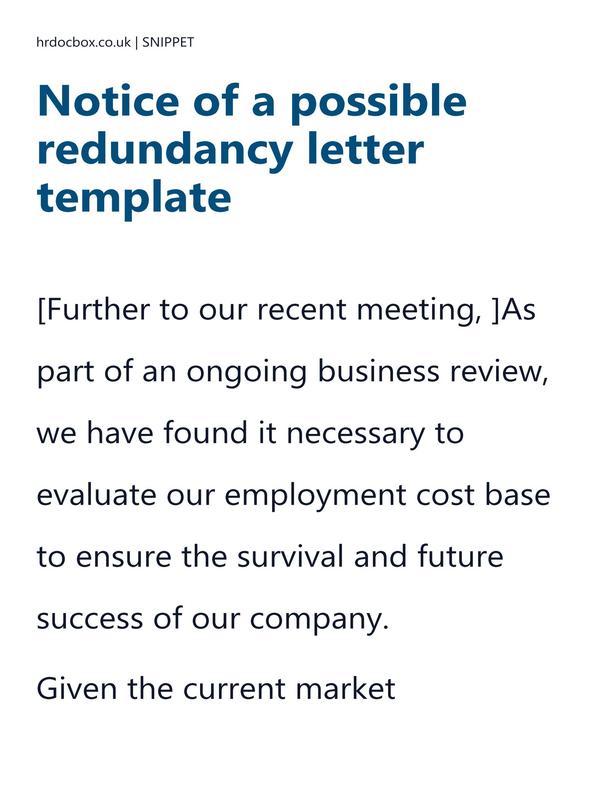Notice of a possible redundancy letter template


If you are considering a possible redundancy, send this model letter template to provide notice of the situation and the reasons why it is under consideration.
- Includes 12 months' access to the Notice of a possible redundancy letter template, with all updates provided free of charge and notified to you.
- UK-specific accuracy.
- 208 words over 1 page.
- Last updated 25/10/2025.
- Format: Word / plain text / email.
- Delivery: Instant download after purchase (no physical item).
- Access: Download link shown here after checkout.
- This Notice of a possible redundancy letter template will SAVE you up to 1 hour drafting & research, save you money, and reduce your risk.
[Sender name]
[Sender address]
[date]
[Recipient name]
[Recipient address]
Dear [Recipient first name],
Notice of Possible Redundancies
[Further to our recent meeting, ]As part of an ongoing business review, we have found it necessary to evaluate our employment cost base to ensure the survival and future success of our company.
Given the current market conditions, specifically [insert specific conditions], we need to explore various ways to reduce our costs. Regrettably, this may include potential redundancies.
We are sending this letter
This is a 30% preview of the Notice of a possible redundancy letter template. For instant full access, purchase this item or a parent bundle.
Notice of a possible redundancy letter template purpose
A Notice of Possible Redundancy letter informs an employee that their job may be at risk of redundancy. It is typically issued when an organisation is going through a process of restructuring or downsizing, and there is a possibility that some employees' roles may become redundant.
The purpose of the letter is to inform the employee of the situation and to invite them to attend a meeting to discuss the potential redundancy and explore alternative options, such as redeployment or retraining.
The letter should include information on the reasons for the potential redundancy, the selection criteria that will be used to determine which employees will be affected, and the consultation process that will be followed.
It is important to note that a Notice of Possible Redundancy letter does not necessarily mean that the employee will be made redundant. It is an initial step in the redundancy process, and the employee has the right to be consulted and to explore alternative options before any final decision is made.
Practical application of a Notice of a possible redundancy letter template
- The Notice of a possible redundancy letter template should be actioned / delivered as early as possible, as this allows the employee to prepare for the possibility of redundancy and explore alternative employment options if necessary.
- It is sent / delivered by an employer / HR team to an employee.
Compliance
Compliance
This Notice of a possible redundancy letter template incorporates relevant UK laws and HR standards, including those listed below:
-
The Trade Union and Labour Relations (Consolidation) Act 1992: This act sets out the legal framework for collective consultation in the event of redundancies. If an employer is proposing to make 20 or more employees redundant within a 90-day period, they must engage in collective consultation with any trade union or employee representatives.
-
The Employment Rights Act 1996: This legislation outlines the rights of employees in relation to redundancy, including the requirement for employers to consult with affected employees. Employers must provide information on the reasons for the proposed redundancies, the number of employees likely to be affected, and the proposed selection criteria.
-
The Equality Act 2010: This act prohibits discrimination on the grounds of certain protected characteristics, such as age, gender, race, disability, and sexual orientation. Employers must ensure that their redundancy selection process does not discriminate against employees on any of these grounds.
-
The Working Time Regulations 1998: This legislation sets out the maximum number of hours that employees can work each week, as well as minimum rest breaks and annual leave entitlements. Employers must ensure that any changes to working patterns or hours as a result of redundancy do not breach these regulations.
Before starting a redundancy process, you should consider all options to reduce or even avoid redundancies.
For example, you could see if you can:
-
offer voluntary redundancy
-
change working hours
-
move employees into other roles
-
let go of temporary or contract workers
-
limit or stop overtime
-
not hire any new employees
Notice of a possible redundancy workflow
Notice of a possible redundancy workflow
Check which resources should be implemeted before and/or after the Notice of a possible redundancy letter template, to understand the workflow.
Redundancy proposal meeting script
Use this model template as a script for holding a meeting to communicate a proposed redundancy situation, either with an individual or collectively.
Redundancy consultation information letter
When you commence redundancy consultation, send this model letter to an employee to explain the redundancy process from start to finish.
Frequently Asked Questions about a Notice of a possible redundancy letter template
Frequently Asked Questions about a Notice of a possible redundancy letter template
-
Can I use the Notice of a possible redundancy letter template in my small business?
Yes. The Notice of a possible redundancy letter template is designed to be flexible and suitable for organisations of all sizes, including small businesses and charities. It follows UK employment law best practice, so even if you don't have an in-house HR team, you can confidently apply it.
-
Is the Notice of a possible redundancy letter template compliant with 2026 UK employment law?
Absolutely. Like the Notice of a possible redundancy letter template, all of our templates are drafted with the latest ACAS guidance and UK employment legislation in mind. We review and update them regularly, so you can be confident they remain compliant.
-
Can I customise the Notice of a possible redundancy letter template for my organisation?
Yes, we highlight the areas of the Notice of a possible redundancy letter template that you need to update with your own details, and where you need to make decisions to suit your situation. This saves you time and ensures that you meet best practice.
-
Do I get instant access to the Notice of a possible redundancy letter template?
Yes. Once purchased, you'll be able to download the Notice of a possible redundancy letter template instantly. Templates are provided in editable Word or Excel format so you can customise them easily, and in PDF format for easy sharing.
-
What if I need more help, not just a Notice of a possible redundancy letter template?
If you're looking for broader support, we also offer toolkits and library bundles that include the Notice of a possible redundancy letter template, along with other HR templates and policies for fully managing your situation. These may be more cost-effective if you need deeper advice.
-
Why should I use this Notice of a possible redundancy letter template, and not AI to generate it?
The risk of using a free AI-generated template 'without review' includes your legal exposure, missing context, and no awareness of the wider process, whereas purchasing the Notice of a possible redundancy letter template from us mitigates that risk.
